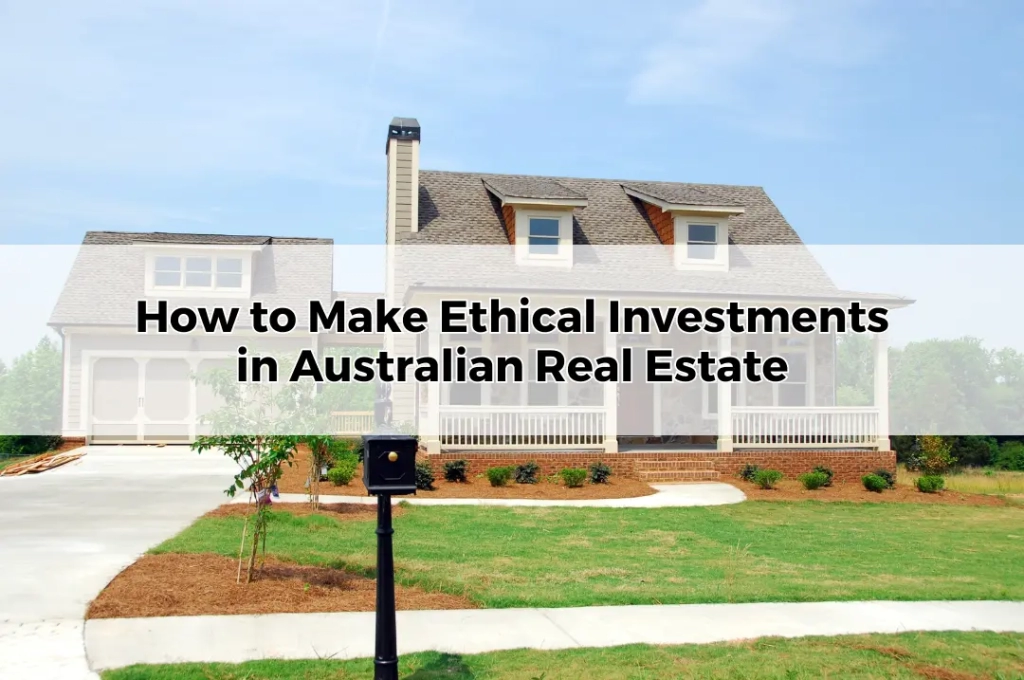How to Make Ethical Investments in Australian Real Estate
Table of Contents
ToggleEthical investing is becoming increasingly popular among Australians who want to align their financial decisions with their values. In real estate, ethical investing means selecting properties or projects that meet specific environmental, social, and governance (ESG) criteria while still delivering strong returns. As real estate is one of the most significant sectors in Australia’s economy, it provides a substantial opportunity for investors to make a positive impact. From supporting sustainable developments to prioritising affordable housing initiatives, ethical investments in real estate can be both profitable and socially responsible. However, achieving this balance requires careful planning, due diligence, and an understanding of what constitutes an ethical investment in the context of property.
This blog explores strategies for making ethical investments in Australian real estate, helping you create a portfolio that reflects your values without compromising on financial outcomes.
What is Ethical Real Estate Investing?
Ethical real estate investing involves choosing property investments that contribute to positive social and environmental outcomes. This could include supporting developments that prioritise sustainability, investing in properties that meet green building standards, or contributing to affordable housing initiatives that address societal needs. While the financial return is still a key consideration, ethical investors also assess the broader impact of their investments on the community and environment.
In Australia, ethical real estate investing has gained momentum as awareness of climate change and social inequality grows. Properties that meet ESG standards are increasingly in demand, not only among investors but also tenants and buyers. Ethical investments often involve partnerships with developers or funds that are committed to sustainable and socially responsible practices, ensuring that your investment aligns with your values while contributing to long-term societal goals.
The Benefits of Ethical Real Estate Investments
One of the most compelling reasons to invest ethically is the alignment of your financial goals with your personal values. Ethical real estate investments allow you to support projects that promote environmental sustainability or social equity, providing a sense of purpose alongside financial returns. Additionally, ethical properties often attract higher-quality tenants, including those who prioritise energy efficiency or sustainable living, leading to more stable rental income and potentially higher property values.
From an investment perspective, properties that adhere to ESG principles often perform better over the long term. For example, energy-efficient buildings typically have lower operational costs, making them more attractive to tenants and buyers. Furthermore, as regulations around sustainability tighten in Australia, properties that already meet high environmental standards are likely to appreciate in value, providing a financial advantage to ethical investors. Ethical investments also carry reputational benefits, demonstrating your commitment to responsible investment practices.
Defining Your Ethical Investment Criteria
The first step in making ethical investments in Australian real estate is defining what “ethical” means to you. Some investors may prioritise environmental sustainability, focusing on properties with solar panels, energy-efficient appliances, or green building certifications. Others may prioritise social outcomes, such as supporting affordable housing developments or investing in properties that contribute to community well-being.
Your ethical criteria should align with your broader financial goals and risk tolerance. For instance, if you’re focused on long-term growth, you may lean towards sustainable commercial developments in high-demand areas. Alternatively, if you’re interested in social equity, you might consider investments in regional or low-income housing markets that address housing shortages. Clearly defining your values ensures that your investment decisions are both purposeful and consistent.
Conducting Due Diligence on Ethical Investments
Due diligence is critical when evaluating ethical real estate opportunities. Start by researching the developer or fund managing the project to ensure their values align with yours. Look for certifications such as Green Star, NABERS (National Australian Built Environment Rating System), or other ESG benchmarks that indicate the property meets high environmental standards.
Additionally, assess the broader impact of the property on the community. For example, does the development include green spaces, prioritise walkability, or contribute to local infrastructure? Review the project’s compliance with Australian environmental regulations and its commitment to minimising carbon emissions. If investing in residential real estate, consider whether the property provides affordable housing options or supports diverse community needs. Thorough research helps ensure that your investment is genuinely ethical and not simply a case of “greenwashing.”
Investing in Sustainable Developments
Sustainable developments are a cornerstone of ethical real estate investing. These projects prioritise energy efficiency, renewable energy integration, and environmentally friendly building materials. In Australia, sustainable developments often aim to reduce carbon footprints by incorporating solar power, water recycling systems, and sustainable landscaping.
By investing in sustainable properties, you not only contribute to environmental preservation but also position your portfolio for future growth. As tenants and buyers increasingly prioritise sustainability, demand for eco-friendly properties is likely to rise. Furthermore, properties with energy-efficient features often have lower operational costs, making them more appealing to renters and owners alike. Investing in developments with Green Star or NABERS ratings is a tangible way to ensure your real estate investments align with environmental goals.
Supporting Affordable Housing Initiatives
Investing in affordable housing is another way to make a meaningful social impact through real estate. In Australia, housing affordability is a significant issue, with many families struggling to secure adequate housing in major cities and regional areas. Ethical investors can address this need by supporting projects that provide affordable rental or purchase options, particularly for low-income households or key workers.
Affordable housing investments often involve partnerships with government programs or non-profit organisations, offering incentives such as tax benefits or guaranteed rental income. While the financial returns may be more modest compared to high-end property investments, the social impact of affordable housing projects can be profound. These investments contribute to community stability and equity, aligning with the goals of many ethical investors.
Exploring Ethical Real Estate Funds
For investors seeking professional management and diversified exposure, ethical real estate funds are an excellent option. These funds pool capital to invest in a portfolio of properties that meet specific ESG criteria. By investing in an ethical real estate fund, you gain access to larger developments, such as sustainable commercial buildings or community-focused housing projects, that may be out of reach for individual investors.
Ethical real estate funds also benefit from professional expertise in identifying and managing properties that align with ESG goals. Many of these funds regularly report on their environmental and social impact, providing transparency and accountability to investors. Before investing, review the fund’s investment mandate and track record to ensure it aligns with your ethical and financial objectives.
Balancing Financial Returns with Ethical Goals
A common concern for ethical investors is whether prioritising ESG principles will compromise financial returns. In real estate, this trade-off is often less pronounced, as properties that meet high ethical standards are frequently more resilient and in demand. However, it’s important to maintain a balanced approach, ensuring your portfolio delivers adequate returns to support your financial goals.
Work with a financial adviser to develop a diversified real estate investment strategy that balances ethical objectives with financial performance. For example, you might combine high-growth sustainable developments with stable, income-generating properties to achieve a mix of social impact and financial security. A well-rounded portfolio ensures that your ethical investments remain both meaningful and profitable.
Monitoring and Adjusting Your Portfolio
Ethical investing is not a one-time decision but an ongoing process that requires regular monitoring. As regulations and market trends evolve, the ethical standards of your investments may need reassessment. For instance, a property once considered sustainable may fall short of updated environmental benchmarks, or new opportunities may arise that better align with your values.
Review your portfolio annually to ensure it continues to meet both your ethical and financial criteria. Engage with property managers or fund administrators to stay informed about the performance and impact of your investments. Adjusting your strategy as needed ensures your portfolio remains aligned with your goals over the long term.
Conclusion
Ethical investing in Australian real estate offers a unique opportunity to align your financial goals with your personal values. By prioritising ESG principles, you can support sustainable developments, address housing affordability, and contribute to community well-being while achieving solid financial returns. Success in ethical real estate investing requires careful planning, due diligence, and a commitment to balancing impact with profitability. Whether you invest directly in sustainable properties, support affordable housing projects, or diversify through ethical real estate funds, the key is to define your values and choose investments that reflect them. Consulting with a financial adviser can help you navigate this process, ensuring your real estate portfolio delivers both meaningful impact and long-term financial security.









